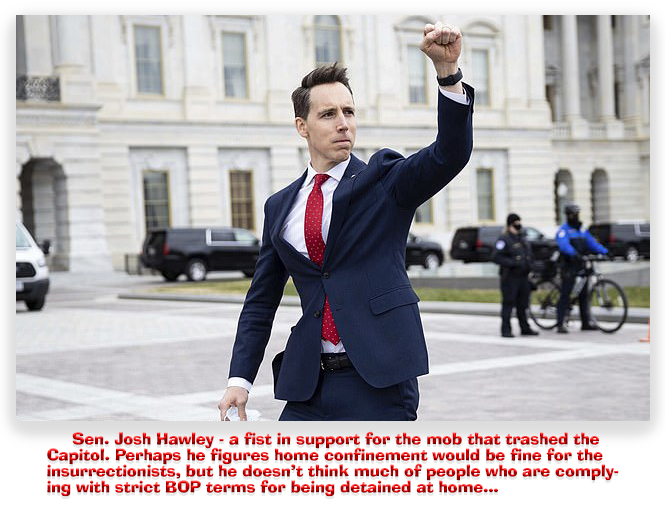We post news and comment on federal criminal justice issues, focused primarily on trial and post-conviction matters, legislative initiatives, and sentencing issues.

LOBBYING EFFORT ON CARES ACT HOME CONFINEMENT MAY BE BEARING FRUIT
FAMM started to turn up the heat last week on an effort to get President Joe Biden and Attorney General Merrick Garland to rescind the January 15 memo from DOJ’s Office of Legal Counsel that would lead to the return of people now on home confinement under CARES Act placement to federal prison when the pandemic ends.
The memo was a prime topic yesterday when Bureau of Prisons Director Michael Carvajal testified before the Senate Judiciary Committee. Judging from the questions coming from both Republicans and Democrats on the Senate Judiciary Committee (with the exception of the execrable Sen. Tom Cotton [R-Klingon Empire] and Sen. Josh Hawley [R-Mongol Horde]), the FAMM campaign is bearing fruit.
The OLC memo, issued in the final days of the Trump administration, would force the BOP to send several thousand people currently on home confinement. Carvajal said it would probably affect somewhere around 2,500 people now on home confinement with a year or more to go on their sentences. A few more than 300 have lengthy sentences left. Of the group, he said 21 have been returned to BOP custody, but only two of those were because of new criminal conduct.
The memo is incorrect as a matter of law and would impose devastating human costs, as well as a negative impact on public safety. Sen. Richard Durbin (D-Illinois), chair of the Committee, said yesterday he was writing to Garland to urge him to reconsider his predecessor’s opinion.
FAMM and 28 other advocacy groups sent a letter to Biden and Garland on April 1st. FAMM has launched the “Keep Them Home” campaign, and is both collecting signatures on a petition and calling on people to call Garland’s office in order to get the Administration to rescind the memo.
 FAMM president Kevin Ring told The Appeal that those who were released did not expect to have to return to prison. “These folks came home and were told, ‘You’re not going to have to come back,’” Ring said. “They reunited with their families. Some of them have kids who they said, ‘I’m home.’ They said, ‘Do you have to go back, Dad?’ ‘No.’ So this changes everything.”
FAMM president Kevin Ring told The Appeal that those who were released did not expect to have to return to prison. “These folks came home and were told, ‘You’re not going to have to come back,’” Ring said. “They reunited with their families. Some of them have kids who they said, ‘I’m home.’ They said, ‘Do you have to go back, Dad?’ ‘No.’ So this changes everything.”
Earlier, the BOP declined to answer reporters’ questions about the memo, but Joe Rojas, Southeast Regional Vice President of the union representing BOP employees, said sending everyone back to prison would be logistically impossible. “We have no staff,” he told The Sentinel, “We are already in chaos as it is.”
But yesterday, Carvajal said that the BOP has ample space to absorb the home confinees if they were to return. Nevertheless, he expressed no opinion on whether they should come back. The Director noted that the issue is not immediate, because the pandemic emergency has been extended by the President.
 My take on Carvajal’s position (for what it’s worth) is that his bias leans toward leaving people who have complied with their home confinement terms at home. He said repeatedly that the BOP’s mission was to successfully return people to the committee, and as long as home confinees are successful at home, there was nothing wrong with leaving them there.
My take on Carvajal’s position (for what it’s worth) is that his bias leans toward leaving people who have complied with their home confinement terms at home. He said repeatedly that the BOP’s mission was to successfully return people to the committee, and as long as home confinees are successful at home, there was nothing wrong with leaving them there.
However, Carvajal said that the BOP’s primary interest was to follow the law, and he urged lawmakers to amend the home confinement statute to make clear what should be done.
The Appeal, Unless The Biden Administration Acts, Thousands Could Go Back To Federal Prison (April 5, 2021)
KSU The Sentinel, Inmates under house arrest in the event of a pandemic could return to prisons in the United States (April 11, 2021)
Senate Judiciary Committee, Oversight Hearing on Bureau of Prisons (April 15, 2021)
– Thomas L. Root


